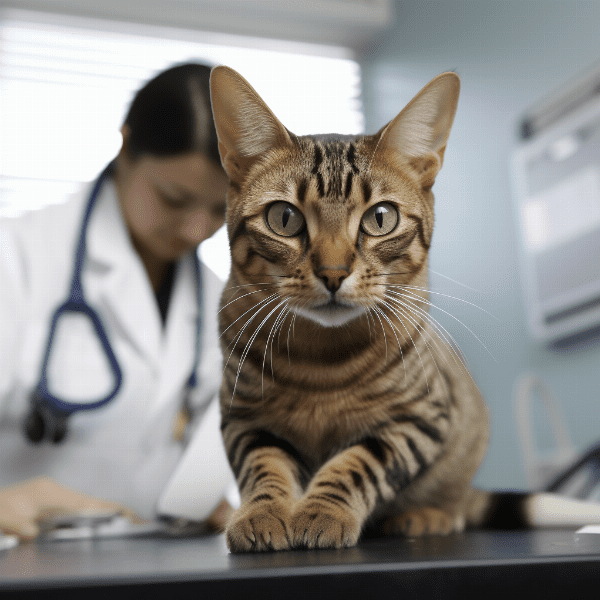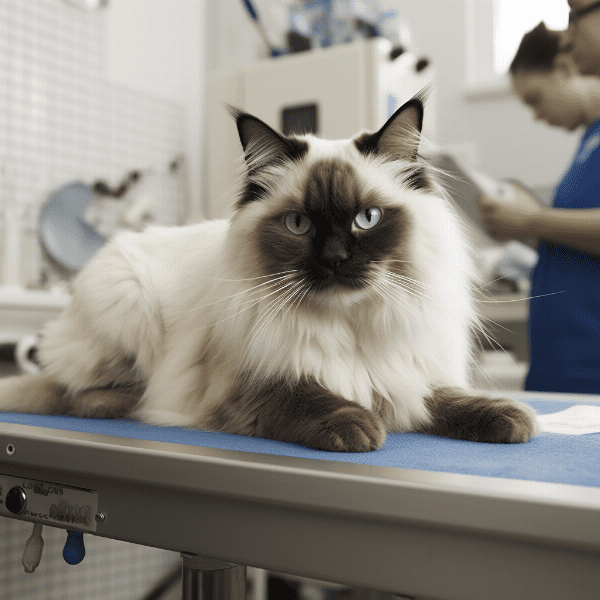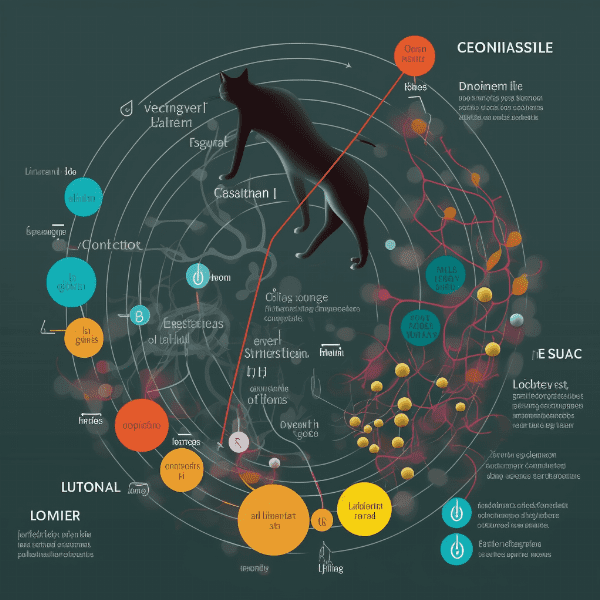Table of Contents
- Introduction to Feline Genetic Disorders
- Common Feline Genetic Disorders
- Diagnosis of Genetic Disorders in Cats
- Treatment Options for Feline Genetic Disorders
- Preventing Genetic Disorders in Your Cat
- Genetic Testing for Cats
- Living with a Cat with a Genetic Disorder
- Future of Genetic Research in Feline Health
- Resources for Cat Owners with Genetic Disorder Concerns
Introduction to Feline Genetic Disorders
As with any living organism, cats are subject to genetic variations that can affect their health. These variations can manifest as genetic disorders, which are caused by abnormalities in the genes that control various aspects of feline health. Some genetic disorders can be life-threatening, while others may result in more minor health problems. It’s important for cat owners to be aware of the potential genetic disorders that their pets may be predisposed to and to take steps to prevent or manage them.
Understanding Genetics
Before we delve into specific genetic disorders that affect cats, it’s important to have a basic understanding of genetics. Each living organism, including cats, has a set of genes that determine their physical and behavioral characteristics. These genes are made up of DNA, which contains the instructions for building and maintaining the body’s various systems. When a cat reproduces, its genes are passed down to its offspring, which means that certain genetic traits can be inherited from one generation to the next.
Types of Genetic Disorders in Cats
There are many different types of genetic disorders that can affect cats. Some of the most common include:
- Polycystic Kidney Disease (PKD)
- Hypertrophic Cardiomyopathy (HCM)
- Progressive Retinal Atrophy (PRA)
- Feline Lower Urinary Tract Disease (FLUTD)
- Hemophilia B
These disorders can vary widely in severity and may be caused by different types of genetic mutations. Some may be dominant, which means that only one copy of the mutated gene is needed to cause the disorder, while others may be recessive, which requires two copies of the mutated gene.
Risk Factors for Feline Genetic Disorders
Certain breeds of cats may be more predisposed to certain genetic disorders than others. For example, PKD is more commonly found in Persian cats, while HCM is more prevalent in Maine Coons. Additionally, cats that are closely related (such as those from the same litter) may be more likely to inherit genetic disorders. It’s important for cat owners to be aware of the potential risk factors for their pets and to take steps to prevent or manage any genetic disorders that may arise.
In the next sections, we will delve deeper into specific feline genetic disorders, their symptoms, diagnosis, treatment options, and how to prevent or manage them.
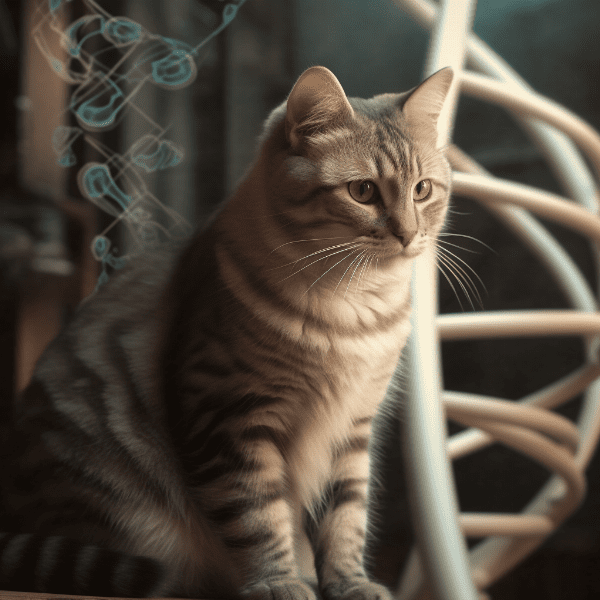
Common Feline Genetic Disorders
There are several genetic disorders that are commonly seen in cats, and they can vary widely in severity and symptoms. Here are some of the most common feline genetic disorders:
Polycystic Kidney Disease (PKD)
PKD is a genetic disorder that affects the kidneys, causing fluid-filled cysts to form. These cysts can grow in size and number, eventually leading to kidney failure. This disorder is most commonly found in Persian cats and their hybrids, and can be diagnosed through genetic testing or ultrasound imaging.
Hypertrophic Cardiomyopathy (HCM)
HCM is a genetic disorder that affects the heart, causing thickening of the heart muscle. This can result in poor heart function, and can eventually lead to heart failure. Maine Coon cats and Ragdolls are more commonly affected by this disorder, and it can be diagnosed through a combination of physical exam, echocardiogram, and genetic testing.
Progressive Retinal Atrophy (PRA)
PRA is a genetic disorder that affects the eyes, causing gradual degeneration of the retina. This can lead to blindness over time. PRA can be diagnosed through an eye exam by a veterinary ophthalmologist, and genetic testing can also confirm the presence of the gene mutation that causes the disorder.
Feline Lower Urinary Tract Disease (FLUTD)
FLUTD is a disorder that affects the urinary tract, causing symptoms such as difficulty urinating, blood in the urine, and frequent urination. This disorder can have a genetic component, and certain breeds such as Siamese and Burmese cats may be more predisposed to it. Diagnosis is typically made through a combination of physical exam, urinalysis, and sometimes imaging.
Hemophilia B
Hemophilia B is a genetic disorder that affects blood clotting, leading to prolonged bleeding after injury or surgery. This disorder is caused by a deficiency in clotting factor IX, and can be diagnosed through blood tests and genetic testing. Hemophilia B is rare in cats, but some breeds such as the Somali may be more predisposed to it.
These are just a few examples of the many genetic disorders that can affect cats. In the next sections, we will explore in more detail the diagnosis, treatment, and prevention of these disorders, as well as other genetic disorders that may affect felines.
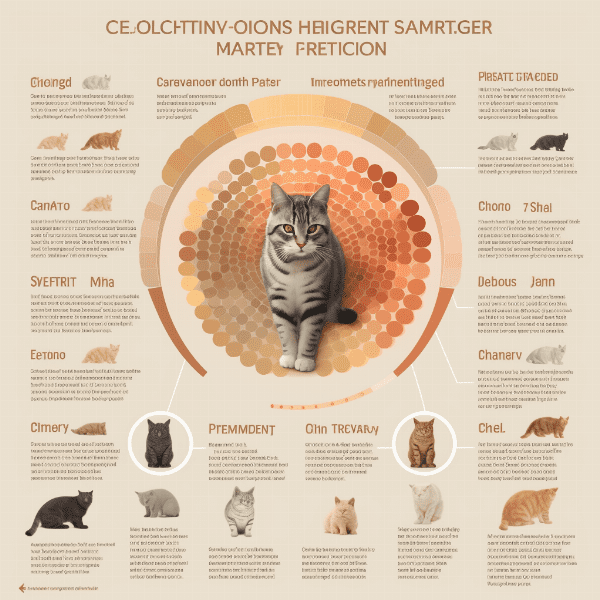
Diagnosis of Genetic Disorders in Cats
Diagnosing genetic disorders in cats can be challenging, as symptoms may not always be apparent or may be mistaken for other health issues. However, early diagnosis is important in order to provide the best possible treatment and management options. Here are some of the methods used to diagnose genetic disorders in cats:
Physical Exam and Medical History
A thorough physical exam by a veterinarian can often provide clues to the presence of a genetic disorder. This may include checking for abnormal growths or other physical abnormalities. The cat’s medical history, including any known family history of genetic disorders, can also provide important information.
Imaging
Imaging techniques such as ultrasound or radiography may be used to diagnose genetic disorders that affect the organs, such as PKD or HCM. These tests can provide detailed images of the affected area, allowing for more accurate diagnosis and treatment planning.
Blood Tests
Blood tests may be used to diagnose genetic disorders that affect blood clotting, such as Hemophilia B. These tests can measure levels of clotting factors in the blood and identify any deficiencies.
Biopsy
In some cases, a tissue biopsy may be necessary to diagnose a genetic disorder. This involves taking a small sample of tissue from the affected area and examining it under a microscope for abnormalities.
Overall, the diagnosis of genetic disorders in cats often involves a combination of these methods. It’s important for cat owners to be aware of the potential risk factors for genetic disorders in their pets and to work closely with their veterinarian to diagnose and manage any issues that may arise.

Treatment Options for Feline Genetic Disorders
While genetic disorders in cats cannot be cured, there are several treatment options available that can help manage symptoms and improve quality of life. The specific treatment options will depend on the type and severity of the genetic disorder, as well as the individual needs of the cat. Here are some common treatment options for feline genetic disorders:
Medications
Many genetic disorders can be managed with medication. For example, cats with HCM may be prescribed medications to help manage their heart function, while cats with FLUTD may be given medications to help control urinary tract inflammation. Medications can help manage symptoms and improve overall health.
Specialized Diets
Some genetic disorders, such as PKD, may benefit from specialized diets that help manage symptoms and prevent complications. These diets are formulated to meet the unique nutritional needs of cats with these disorders, and can be an important part of managing their health.
Surgery
In some cases, surgery may be necessary to manage the symptoms of a genetic disorder. For example, cats with PKD may benefit from surgical removal of cysts in their kidneys. Surgery can be a more invasive option, but can be effective in managing symptoms and improving quality of life.
Lifestyle Modifications
Lifestyle modifications can also be an important part of managing genetic disorders in cats. For example, cats with PRA may benefit from modifications to their living environment to help them navigate their surroundings better, while cats with HCM may benefit from regular exercise to help manage their heart function. These modifications can help improve overall health and well-being.
Supportive Care
In some cases, supportive care may be the best option for managing a genetic disorder in a cat. This can include things like pain management, regular check-ups with a veterinarian, and providing a comfortable living environment. Supportive care can be an important part of managing symptoms and improving quality of life.
In some cases, a combination of these treatment options may be necessary to effectively manage a genetic disorder in a cat. It’s important for cat owners to work closely with their veterinarian to determine the best treatment plan for their pet’s individual needs.
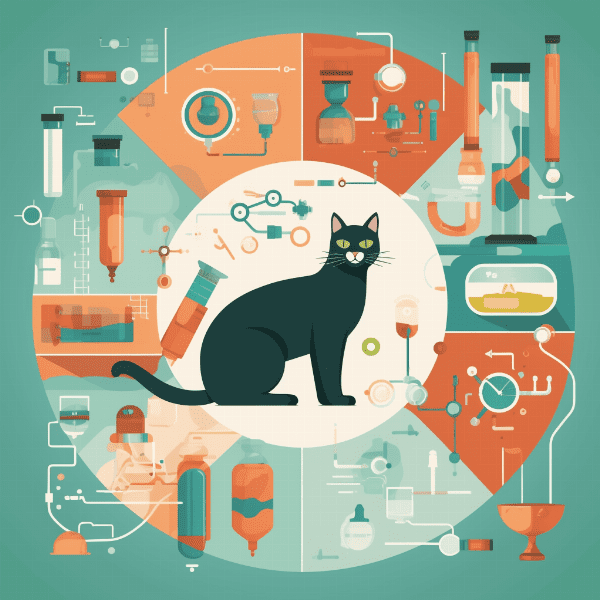
Preventing Genetic Disorders in Your Cat
While it’s not always possible to prevent genetic disorders in cats, there are several steps that can be taken to reduce the risk of these disorders and promote overall feline health. Here are some strategies for preventing genetic disorders in cats:
Choose a Reputable Breeder
If you’re planning to adopt a purebred cat, it’s important to choose a reputable breeder who performs genetic testing on their cats. This can help reduce the risk of inheriting genetic disorders, as the breeder will be able to identify cats with potential health issues and avoid breeding them.
Spay or Neuter Your Cat
Spaying or neutering your cat can help reduce the risk of certain genetic disorders, as well as other health issues such as reproductive cancers. This can also help control the cat population and reduce the number of cats in shelters.
Provide Good Nutrition
Feeding your cat a healthy, balanced diet can help promote overall health and reduce the risk of certain genetic disorders. Consult with your veterinarian to determine the best diet for your cat’s individual needs.
Regular Veterinary Check-Ups
Regular check-ups with a veterinarian can help identify potential health issues early, before they become more serious. This can include genetic disorders as well as other health issues.
Avoid Inbreeding
Inbreeding, or breeding closely related cats, can increase the risk of genetic disorders. Avoid breeding cats that are closely related to each other, such as siblings or parent-offspring pairs.
Genetic Testing
Genetic testing can be done on cats to identify potential health issues and determine the risk of inheriting certain genetic disorders. This can be particularly important for purebred cats, as certain breeds may be more predisposed to specific genetic disorders.
By taking these steps, cat owners can help reduce the risk of genetic disorders in their pets and promote overall feline health. It’s important to work closely with a veterinarian to determine the best prevention strategies for your cat’s individual needs.
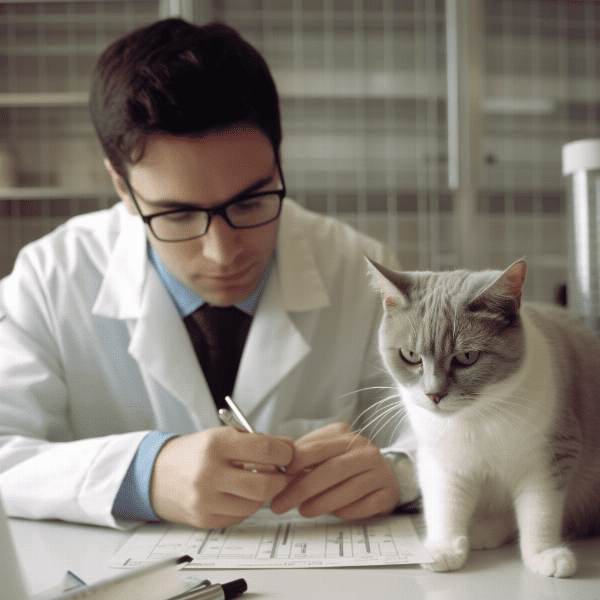
Genetic Testing for Cats
Genetic testing can be an important tool for identifying potential health issues in cats and determining the risk of inheriting certain genetic disorders. Here’s what you need to know about genetic testing for cats:
What is Genetic Testing?
Genetic testing involves analyzing a sample of a cat’s DNA to look for specific mutations that are known to cause genetic disorders. This can be done through a blood test or a cheek swab, and can be performed at any age.
Why is Genetic Testing Important?
Genetic testing can help identify potential health issues early, before symptoms become apparent. This can allow for earlier intervention and treatment, which can improve overall health and quality of life. In addition, genetic testing can help breeders make informed decisions about which cats to breed and which to avoid, which can help reduce the risk of genetic disorders in future generations.
How is Genetic Testing Done?
Genetic testing can be done through a variety of methods, depending on the specific disorder being tested for. The most common methods include polymerase chain reaction (PCR) testing, which amplifies DNA segments to look for specific mutations, and sequencing, which reads the entire DNA sequence to look for mutations.
What Can Genetic Testing Identify?
Genetic testing can identify the presence of specific mutations that are known to cause genetic disorders. This can include disorders such as PKD, HCM, PRA, and Hemophilia B, among others. Genetic testing can also be used to determine the likelihood of a cat passing on a genetic disorder to its offspring.
Is Genetic Testing Right for Your Cat?
Genetic testing can be a valuable tool for identifying potential health issues in cats and helping breeders make informed decisions. However, it’s important to weigh the benefits and risks of testing, as well as the potential costs. Discuss your concerns with your veterinarian to determine if genetic testing is right for your cat.
Overall, genetic testing can be an important tool for managing feline health and reducing the risk of genetic disorders in cats. By working closely with a veterinarian and breeders who perform genetic testing, cat owners can help promote overall feline health and well-being.
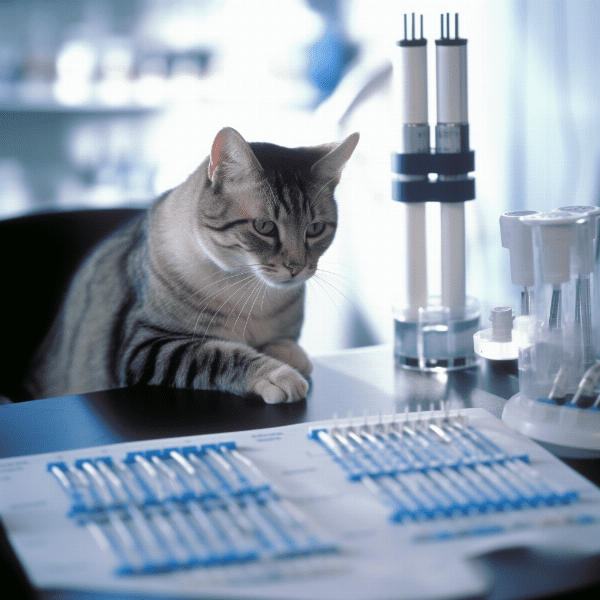
Living with a Cat with a Genetic Disorder
Living with a cat that has a genetic disorder can be challenging, but there are many ways to help manage symptoms and improve quality of life. Here are some tips for living with a cat with a genetic disorder:
Educate Yourself
Learn as much as you can about your cat’s specific genetic disorder, including the symptoms, treatment options, and potential complications. This can help you make informed decisions about your cat’s care and ensure that you are providing the best possible treatment.
Work with Your Veterinarian
Your veterinarian can be an invaluable resource for managing your cat’s genetic disorder. Work closely with your veterinarian to develop a treatment plan that meets your cat’s individual needs and ensures the best possible outcome.
Provide a Comfortable Living Environment
Cats with genetic disorders may have unique needs when it comes to their living environment. For example, cats with PRA may benefit from a living space that is free of obstacles, while cats with HCM may benefit from a calm, stress-free environment. Work to create a living environment that is comfortable and safe for your cat.
Follow Treatment Recommendations
Be sure to follow your veterinarian’s recommendations for managing your cat’s genetic disorder, including medications, specialized diets, and lifestyle modifications. This can help manage symptoms and improve overall health.
Seek Support
Living with a cat with a genetic disorder can be emotionally and financially challenging. Seek support from friends, family, and other cat owners who may be going through similar experiences. Consider joining a support group or online community to connect with others and share information.
Overall, living with a cat with a genetic disorder can be challenging, but it’s important to remember that there are many ways to manage symptoms and improve quality of life. By working closely with your veterinarian and providing a comfortable living environment, you can help your cat live a happy, healthy life despite their genetic disorder.

Future of Genetic Research in Feline Health
As genetic testing and research continue to advance, the future of feline health looks promising. Here are some potential areas of future research and development:
Improved Genetic Testing
As genetic testing becomes more common and accessible, it’s likely that we will see continued improvements in the accuracy and specificity of these tests. This can help identify potential health issues earlier and with greater precision, leading to more effective treatment and management options.
Gene Therapy
Gene therapy involves using modified genes to treat or cure genetic disorders. While still in the early stages of development, gene therapy has shown promise in treating certain genetic disorders in other animals, and may hold potential for use in cats in the future.
Genome Sequencing
Whole genome sequencing involves reading an individual’s entire DNA sequence, which can help identify potential genetic disorders and provide personalized treatment options. As the cost of genome sequencing continues to decrease, this technology may become more accessible for feline health research.
Breed-Specific Research
Many genetic disorders are more commonly found in certain cat breeds. By focusing research efforts on these breeds, we may be able to better understand the underlying causes of these disorders and develop more effective prevention and treatment strategies.
Collaboration and Data Sharing
Collaboration and data sharing among researchers and veterinary professionals can help accelerate progress in feline genetic research. By working together, we can share knowledge and resources to better understand feline genetic disorders and develop more effective treatments.
Overall, the future of genetic research in feline health looks promising. By continuing to invest in research and development, we can improve the lives of cats with genetic disorders and promote overall feline health and well-being.

Resources for Cat Owners with Genetic Disorder Concerns
If you’re a cat owner with concerns about genetic disorders in your pet, there are several resources available to help you navigate this complex topic. Here are some resources to consider:
Your Veterinarian
Your veterinarian is an important resource for managing your cat’s health, including potential genetic disorders. Be sure to discuss any concerns you have with your veterinarian, and work closely with them to develop a treatment plan that meets your cat’s individual needs.
Breed-Specific Organizations
Many purebred cat breeds have organizations dedicated to promoting the health and well-being of their breed. These organizations may offer resources and information on breed-specific genetic disorders, as well as advice on breeding and genetic testing.
Genetic Testing Laboratories
If you’re considering genetic testing for your cat, there are several laboratories that offer this service. Be sure to choose a reputable laboratory that uses accurate and reliable testing methods.
Online Communities
There are many online communities and forums for cat owners and breeders, where you can connect with others and share information and experiences. These communities can be a valuable resource for finding support and information on managing genetic disorders in cats.
Educational Websites
There are several websites dedicated to educating cat owners and breeders on genetic disorders in cats. These websites may offer information on specific disorders, genetic testing, and treatment options.
Overall, there are many resources available to cat owners with concerns about genetic disorders in their pets. By working closely with a veterinarian and accessing reputable resources and information, cat owners can help promote the health and well-being of their pets.


